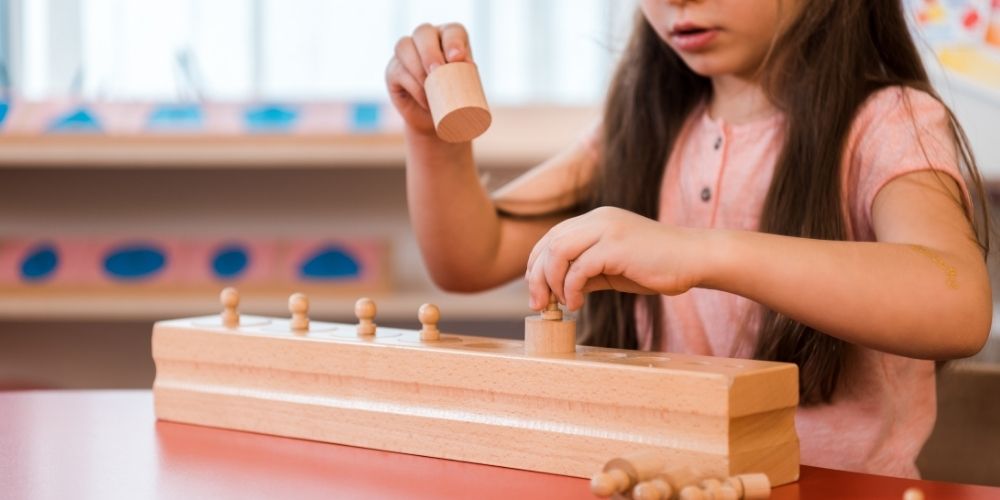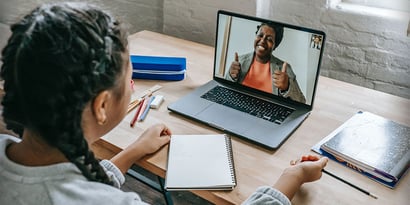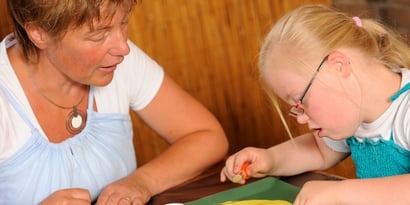Contents
- The benefits of sending a child to preschool
- Motor skills
- Social skills
- Communication and listening
- Problem solving
- Early academic foundations
Preschool is a great place for kids to learn and explore new skills. We’re going to explain the benefits that this critical stage has on a child’s learning and development and how the lessons they learn can carry into the future of a child’s educational career and beyond.
The benefits of sending a child to preschool
Preschool and these early developmental years may be more important than you think. It might look like children are just playing but in doing so they are learning physical, emotional, and academic skills that set them up for the future. It’s been found that ages three to five are critical for learning and have long-term impacts.
Preschool can also be the first time that a child’s parents or teachers see how they react to tasks like reading and writing, which can be key to understanding mental acuity. It can also help adults notice early signs of learning or processing disorders. That means a child could get the necessary support to help them right from the start. 🤗
Let’s look at the main skills a kid will develop at preschool:
- Motor skills
- Social skills
- Communication and listening
- Problem solving
- Teamwork
- Early academic foundations
Motor skills
Children will develop fine and gross motor skills at preschool. Gross motor skills involve the large muscles and hone hand-eye coordination and balance, as well as making children aware of their body parts and how they fit together. Developing good gross motor skills is important as these pave the way to fine motor skills.
Fine motor skills use the small muscles in the body. These are essential to start developing early on because they are needed to write and do other tasks like eating and getting dressed. The impact of this will obviously be felt throughout the schooling years and into adulthood.
Social skills
Children will develop invaluable social skills that will set them up for life. They will learn how to socialise with their peers and other adults appropriately. Preschool will foster sharing, empathy for others, and how to manage conflicts. This is particularly important for children with no siblings so they have an opportunity to play and learn from their peers. 🥰
Communication and listening
The very fact that children need to be away from their parents during preschool hours means they will become more confident and independent too. They will need to ask for help from their teachers at preschool and cannot rely on a parent to identify and meet their every need.
Preschool can sharpen communication skills, including general speech and listening to following directions. This usually benefits parents at home by helping to reduce tantrums or being able to work through them faster if they do occur. That’s because they will have a clearer understanding of what parents expect and be able to express themselves better.
Problem solving
Children learn problem-solving skills by playing with certain toys, interacting with other kids, and through teacher-led activities. These skills are important later on in their education, career, and personal life.
Toys that teach problem-solving skills include puzzles, block games, board games, stacking rings, and sorting or colour-coding games. 🧩
While playing with other kids a child will sometimes need to work out how to get what they want or help a friend. Just figuring out how to get a toy that another kid is using helps develop their problem-solving skills.
Teacher-led activities that contribute to problem-solving skills include storytime questions, organising a paper aeroplane competition, or organising a treasure hunt.
Problem-solving skills are paramount when it comes to academic success. Their benefits will show up for years to come, all the way through to GCSE grades, A-Level results, and Leaving Cert outcomes.
Teamwork
Children learn the importance of teamwork at preschool and how to cooperate with each other. This is often the first stage in their life that kids develop a notion of teamwork. They will also learn other important social skills like sharing and how to take turns.
They learn this from observing those around them and how others interact as well as from team building activities that teachers set. The collaboration and patience this teaches will help them later on in life too.
Early academic foundations
While each preschool will follow its own curriculum, parents can expect some or all of the following to be taught or learned through playing and class-led activities:
- Maths
- Letters and sounds
- Shapes and colours
- Early reading
Parents who want a more rigorous academic environment might want to consider a private preschool or Montessori schools. There is also private tutoring which is a great way to give kids a head start and make sure they are learning what they need at this key developmental stage in their education. ✔️
Let’s look at what kids typically learn in preschool.
Maths
Some mathematical concepts that children learn at this stage are numeracy (counting to 20), time, length, and weight. Introducing these concepts early on also promotes problem solving and reasoning.
Letters and sounds
In preschool, children will learn the alphabet and be taught to read the 26 letters in uppercase and some in lowercase (which are harder to recognise). They will also be able to associate some of the sounds with their corresponding letters.
Shapes and colours
Recognising shapes and colours is important to help children develop visual perceptual skills, which are used in nearly all the tasks we perform. Activities focusing on shapes such as building blocks or matching a shape to a hole improve spatial awareness. Recognising colours and knowing the names can help with maths and other skills like creative writing.
Early reading
Reading aloud in preschool and even earlier can help children with cognition and the academic foundations of language. The simple but effective act of reading aloud to children has the following benefits:
- Builds vocabulary
- Promotes reading
- Improves attention span
- Enhances listening skills
- Boosts creativity
As you can see, the skills and lessons that a child learns at preschool are hugely important and need to be promoted and encouraged. Many of the skills and life lessons come innocently from playing with other kids and educational but fun toys. If you’re a parent with a preschool-aged child then you can implement many of the activities we discussed above at home too.
As we mentioned earlier, private tutoring is also an excellent addition to preschool because the one-on-one teaching is so focused. At GoStudent, we have expert tutors who teach this age group to give them a balanced head start in life. If you’re a parent and would like to try a class out for your little one, we offer the first class for free.









